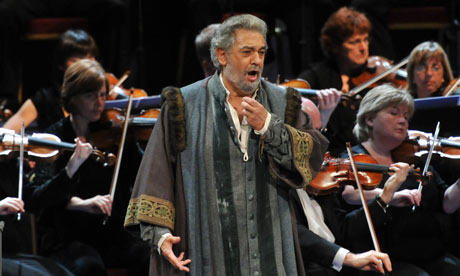
"Plácido Domingo – baritone", we read in the programme for the Royal Opera's Prom of Verdi's Simon Boccanegra. It comes as a bit of a jolt, even though our knowledge that he is now planning to sing Verdi's Rigoletto and Athanaël in Massenet's Thaïs indicates that his shift to lower-lying roles is permanent.
Domingo's Boccanegra has already been analysed in great detail. Encountering him in the role for the first time at the Proms, however, I confess to occasional doubts. As you might expect, his artistry is utterly compelling. His feelings are released in high pianissimos that are simply heart-stopping. Later on, when he harangues his council, we're conscious of accomplished rhetoric and emotional sincerity jostling within his mind.
Yet Domingo's voice is now a low tenor rather than a genuine baritone, and there are consequently moments when the sound seems strange in this music. High F sharps and Gs sound comfortable in passages where Verdi intended effort to be part of the dramatic effect. Low notes can be gravelly where we expect warmth. Most notably, there are losses in heft in some of the ensembles.
As a totality, however, the evening was often magnificent, and worthy of the standing ovation that followed, though Marina Poplavskaya's Amelia was too self-consciously sculpted and glacial for my taste, and Antonio Pappano's conducting sometimes seemed stronger on beauty than tension. Ferruccio Furlanetto's powerhouse Fiesco embodied patrician rigidity, while Joseph Calleja brought the house down as Gabriele Adorno.

